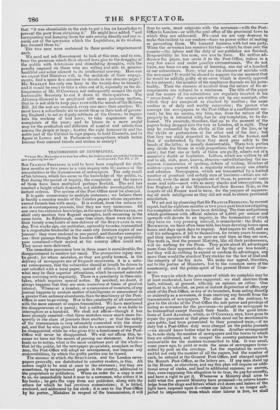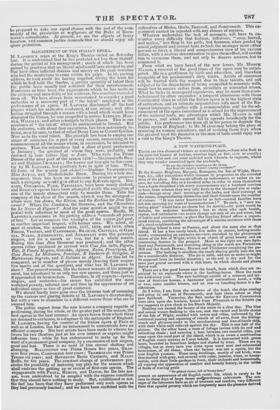TRANSMISSION OP NEWSPAPERS.
«I hear Mrs. Mailsetter is to lose her office, for looking after other folks' business and neglecting heroin." ANTIQUARY, Vol. III. c. 23.
SIR FRANCIS FREE LING is said to have been employed for eigh- teen months or two years in a vain inquiry into the causes of the irregularities in the transmission of newspapers. The only result of his labours, which has come to the knowledge of the public, is, that during the period of inquiry, the complaints and the causes of them have been multiplied perhaps fivefold. The evil has reached a height which demands, not indefinite investigation, but instant redress. The system of the Post-Office must he changed. It is quite unnecessary to multiply instances ; we believe there is hardly a country reader of the London papers whose experience cannot furnish him with many. It is evident, from the notices we see in contemporary journals, that they are very numerous. Of our own too extensive knowledge, in the case of the SPECTATOR, we shall only mention two flagrant examples, both occurring in the same town. In Edinburgh, some time since, there were no fewer than twenty complaints of non-delivery of the SPECTATOR in one day. Two weeks ago, our publisher, agreeably to order, transmitted to a respectable bookseller in the same city fourteen copies of our journal : they were enclosed in one parcel, and therefore conspicu- ous : their passage through the London Office might by possibility pass unnoticed—their arrival at the country office could not. They never were delivered.
The immediate pecuniary loss in these cases is considerable, the disappointment to readers not small. The prospective injury may be great; for where mistakes, as they are gently termed, in the delivery of newspapers are of frequent occurrence, it is a natu- ral consequence, that the subscriber should at length be driven to rest satisfied with a local paper, instead of others, it matters not what may be their superior attractions, which he cannot calculate upon receiving with regularity. There is a peculiarity in these mis- takes, which °requires special notice. By accident, no doubt, it always happens that they are moss numerous at times of greatest interest. Whenever a number, or a succession of numbers, of any journal happens to contain matter of intelligence or amusement in a greater than ordinary abundance, then the machinery of the Post- Office is sure to go wrong. Nor is this peculiarity at all connected with the mere amount of copies transmitted. We have mentioned the disappearance of a parcel ; but a solitary paper is as liable to interruption as a hundred. We shall not affirm—though it has been strongly asserted—that these mistakes occur much more fre- quently in one class of journals than another; - or that the safety of the transmission is very intimately connected with the chan- nel, and that he who gives his order to a newsman will frequently be disappointed, while he who gives it to a functionary of the Post- Office will never be disappointed. We will not affirm this, be- cause we have not the means of proving our statement. And this leads us to notice, what is the most vexatious part of the whole— that let the public, let the newspaper proprietors, complain as they may, the Post-Office will adopt no arrangement, nor impose any responsibilities, by which the guilty parties can be traced. The manner in which the SPECTATOR, and the London news- papers generally, are distributed to country readers, is this. All orders ought to be sent at once to the newsmen ; but they are sometimes, by inexperienced people in the country, addressed to the proprietors or publishers. When an order for a copy is sent to us, we immediately hand it over to a newsman, who enters it in Ins books ; he gets the copy from our publisher, along. with the others for which he had previous commissions ; it is folded, enclosed, and addressed by his clerk ; it is sent to the Post-Office by his porter._Mistakes in respect of the transmission, it will thus be seen, must originate with the newsman—with the Post- Office in London—or with the post-office of the provincial town to which they are addressed. We—and we are very desirous to make this evident to our readers—have no power either of making or preventing them. We transact business with but one party. When the newsman has received his tale—which he does over the counter—the labour and the duty of our publisher are finished. Responsibility he has none, nor can he have. He neither ad- dresses the paper, nor sends it to the Post-Office, unless in a very few cases and under peculiar circumstances. We do not know, nor have we any means of knowing, one out of a hundred of our subscribers. Now, what are the chances of mistake with the newsman ? It would be absurd to suppose for one moment that he would be wilfully guilty of an error which is directly opposed to his interest ; the number of his employers depends on his punc- tuality. Then the chances of accident from the nature of his ar- rangements are reduced to a minimum. The title of the paper and the names of his subscribers are regularly inserted in his " cover-book ;" the names are written out by one assistant, after which they are compared or checked by another ; the same routine is of daily and weekly recurrence ; the person who conveys the newspapers to the Post-Office is a confidential ser- vant ; he has no means, nor time, nor, from the nature of the property he is intrusted with, has he any temptation, to he dis- honest. We conclude, therefore, that up to the moment of the papers being dropped into the box in London, all is right. They may be embezzled by the clerks at this end of the line, or by the clerks or postmasters at the other end of the line ; but that they are safely deposited in the hands of the former, and that if undisturbed by them they must pass safely to the hands of the latter, is morally demonstrable. These two parties may divide the blame in what proportions they find most conve- nient; but that one or both of them are guilty, admits not of a moment's doubt or hesitation. Letters, which are written by all and to all, rich, poor, known, obscure—notwithstanding the nu- merous inaccuracies of spelling, defects of writing, blunders of address—pass current with a regularity which every one admits and admires. Newspapers, which are transmitted by a limited number of punctual and orderly men of business—which are ad- dressed, even the most insignificant of them, to persons of some name and note—meet with asmany checks and interruptions, in free England, as if the Ministers had their Bureau Noir, as the despots of old France used to have, for the purpose of suppress- ing all such intelligence as they did not wish to obtain provincial circulation.
We set out by observing that Sir FRANCIS FREELING, by current report, had for eighteen months or two years past been investigating the complaint which we have been detailing. The time and patience which gentlemen with official. salaries of detailing. per annum and upwards will devote to an inquiry, in the termination of which they have no very pressing interest, is remarkable : the Duke of RICHMOND, we have often been told, has been devoting hours upon hours and days upon days to inquiry. And inquire he will, and so will his colleagues, if left, to themselves, for twenty years to come; and their inquiries will be as near an end then as they are now. The truth is, that the present Ministry, like all their predecessors, will do nothing for the Press. They prate about its advantages more than their opponents do,—and so far they are less honest; but they will do nothing to extend or confirm its advantages, any more than would the sturdiest Tory stickler for the law of libel and the integrity of the Six Acts. We make our appeal, therefore, not to the justice of Ministers, but to the common sense of the community, and the public-spirit of the present House of Com- mons.
Two ways in which the grievance of which we complain maybe at least moderated, have been suggested : we shall mention them both, without, at present, offering an opinion on either. One method is, to interdict, on pain of instant deprivation of office, any clerk of the Post-Office, or any of its branches, from acting directly or indirectly as a newsman, or from receiving any benefit from the transmission of newspapers. The other is, on the contrary, to give to the clerks of the Post-Office the sole power and privilege of acting as newsmen for the provinces—to permit no newspaper to be transmitted except through their hands. If the good inten- tions of Lord ALTHORP, which, as O'CONNELL says, have gone to repair the pavement of that place which must not be mentioned to ears polite, had been prosecuted to their promised issue,—if no duty but a Post-Office duty were charged on the public journals —we should know better what to advise. Another arrangement is, to note daily the number of newspapers and the towns to which they are addressed, and to compel the country postmaster to be accountable for the number transmitted to him. It was usual, some years ago, to print or write the name of newspapers trans- mitted by post on the envelope. Let the regulation be revived, and let not only the number of all the papers, but the number of each, be entered at the General Post-Office, and charged against the Branch Post-Office, as the letters are. If any man stand up in the House, or elsewhere, and say this plan will require an addi- tional array Of clerks, and lead to additional expense, we answer, that, even supposing this allegation to be true, we pay for security, and have a right to get it. Whenever a Ministry shall arise to fulfil what the present Ministry have promised—to relieve know- ledge from the clogs and fetters. which evil-doers and haters of the light have imposed upon it—when our labour is no longer sub- jected to impositions from which other labour is free, we shall



























 Previous page
Previous page